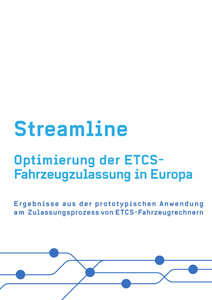Simplified railway approval processes for cross-border rail transport in Europe

A common European transport policy is an important cornerstone for the creation of a European internal market. In the railway sector, however, the various national systems and regulations, including operational regulations, approval requirements for railway technology, control and safety technology and power systems, remained in place. This prevented the emergence of an integrated European rail system and the loss of importance of the rail as a mode of transport in cross-border traffic. From the 1990s onwards, many new directives and regulations, known as the “European Railway Packages” (2001, 2004, 2007, 2013), were issued in order to enable the creation of a single European railway area and thus to make railway traffic more competitive and attractive.
Despite the European initiatives, barriers to cross-border traffic still exist, especially in the approval process for rail vehicles. As part of the Streamline project, IKEM develops concepts to simplify and improve these processes. To this end, IKEM examined the relevant actors in the railway approval process (approval authorities, Notified Bodies (NoBos), Designated Bodies (DeBos), Assessment Bodies (AsBos), manufacturers …). In addition to expert interviews, a newly developed evaluation tool is to be introduced in order to identify inhibiting actors or processes. This information ultimately serves as a basis for making decisions about the award of contracts by market participants or, if necessary, for regulatory adjustments in the approval process.

Streamline: Preliminary study for an assessment tool for actors in the railway approval process, with the aim of identifying inhibiting actors / processes.
Principal: Deutsche Maschinentechnische Gesellschaft
Duration: 10/2015–12/2016